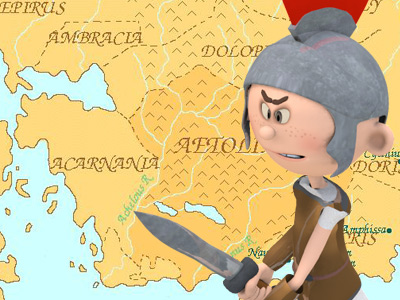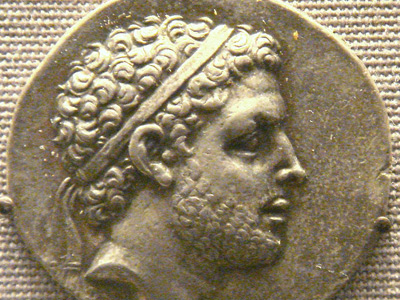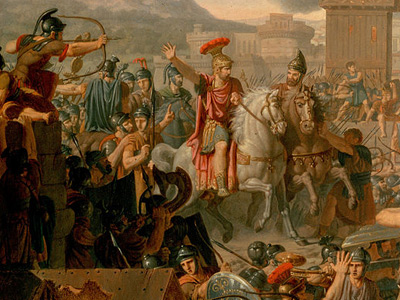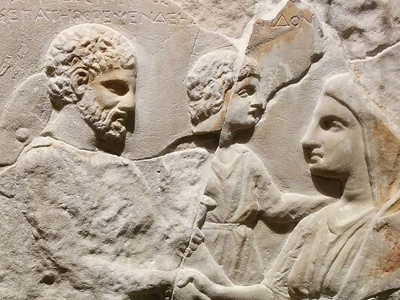Second Macedonian War (200–197 BC)
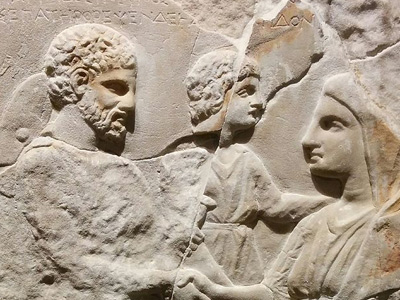
The War
Philip found himself with few active allies in Greece, but there was little enthusiasm for the Roman cause either, the Greeks remembering the frequent brutality of the legions during the First Macedonian War. Most states adopted a policy of waiting to see which way the war went. For the first two years, the Roman campaign was lacklustre. Publius Sulpicius Galba made little headway against Philip and his successor, Publius Villius, had to deal with a mutiny among his own men. In 198 BC, Villius handed command over to Titus Quinctius Flamininus, who would prove a very different kind of general.
Flamininus was not yet thirty and was a self-proclaimed ardent Philhellene. He introduced a new Roman policy for winning the war. Up to this point, the Romans The Roman Republic was a form of government of Rome and the era of the classical Roman civilization when it was run through public representation of the Roman people. Beginning with the overthrow of the Roman Kingdom (traditionally dated to 509 BC) and ending in 27 BC with the establishment of the Roman Empire, Rome's control rapidly expanded during this period - from the city's immediate surroundings to hegemony over the entire Mediterranean world. had merely ordered Philip to stop attacking the southern Greek cities ("peace in Greece"). Now Flamininus demanded that he should withdraw all his garrisons from the southern Greek cities he already held and confine himself to Macedon ("liberty for the Greeks").
The Roman Republic was a form of government of Rome and the era of the classical Roman civilization when it was run through public representation of the Roman people. Beginning with the overthrow of the Roman Kingdom (traditionally dated to 509 BC) and ending in 27 BC with the establishment of the Roman Empire, Rome's control rapidly expanded during this period - from the city's immediate surroundings to hegemony over the entire Mediterranean world. had merely ordered Philip to stop attacking the southern Greek cities ("peace in Greece"). Now Flamininus demanded that he should withdraw all his garrisons from the southern Greek cities he already held and confine himself to Macedon ("liberty for the Greeks").

These books are available for download with Apple Books on your Mac or iOS device
Flamininus led a vigorous campaign against Philip in 198, forcing him to retreat to Thessaly. The cities of the Achaean League, traditionally favourable to Macedon, had been too busy with their war against Sparta to take any part in the Second Macedonian War so far. Roman success against Philip persuaded many of them to abandon their pro-Macedonian stance. Others, such as Argos -point of origin for the old Argead dynasty of Macedon-, remained loyal to Philip.
Philip declared his willingness to make peace, but his overtures came at a critical time for Flamininus just as elections were being held in Rome. Flamininus was eager to take the credit for ending the war but he did not yet know whether his command would be prolonged. He decided to negotiate with Philip while he awaited the outcome of the elections. If they meant he was to be recalled to Rome, then he would make a quick peace deal with the Macedonian. If, on the other hand, his command was extended, then he decided to break off the negotiations and declare war on Philip again. Flamininus and Philip met at Nicaea in Locris in November 198. To prolong the proceedings, Flamininus insisted that all his allies should be present at the negotiations. Flamininus reiterated his demands that Philip should withdraw from the whole of Greece. Philip, who was prepared to give up all his recent conquests in Thrace and Asia Minor, could not go this far. Flamininus persuaded him that the problem was the Greek states who were insisting on this point and suggested he should send an embassy to the Roman Senate. Philip followed his advice but at this moment Flamininus learned that his command had been extended and his friends in Rome successfully interfered with the Macedonian negotiations in Rome so the war could continue.
Seeing things were going Rome's way, Philip's few remaining allies abandoned him (with the exception of Acarnania) and he was forced to raise an army of 25,000 mercenaries. The legions of Titus confronted and defeated Philip at the Aous, However the decisive encounter came at Cynoscephalae in Thessaly in June 197 BC, when the legions of Flamininus defeated Philip's Macedonian phalanx. Philip was forced to sue for peace on Roman terms.
HISTORY
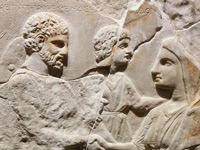
RESOURCES
This article uses material from the Wikipedia article "Second Macedonian War", which is released under the Creative Commons Attribution-Share-Alike License 3.0.
© Stories Preschool. All Rights Reserved.
